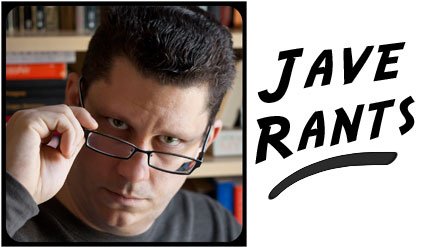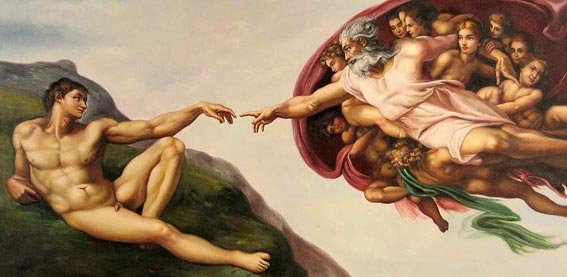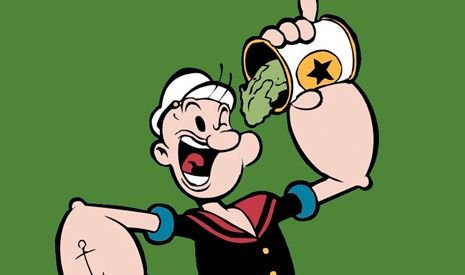On this Sunday morning, let us ask, “What is the meaning of life in a world without God?” I find it strange that so many people wrestle with this question.
Before you jump on me for making an irresponsible or ignorant assumption - that God is a fiction - I ask that you save it for another time. It’s unlikely that we’re going to solve that particular mystery today on Steemit. The point of my post is not to prove anything about a God or gods. Today I’m interested in “meaning” and what that concept actually refers to.
@gavvet recently made a post about evolution that drummed up a lot of conversation. Within the comments section I struck up a dialog with @arrowj, and it focused on the subjects of meaning, purpose, and values. While the exchange was cordial and sincere on both sides, I was struck by how much we were talking past one another. I think the reason for this pass-by was a disagreement or confusion about some basic concepts - the most important one being meaning.
So with that inspiration, it’s time for another episode of

The first obstacle we run up against in our study is that meaning has several meanings. And if we’re not precise, we’re in danger of mixing them up. Dictionary.com provides two definitions:
- what is intended to be, or actually is, expressed or indicated
- the end, purpose, or significance of something
The first meaning of meaning is the most common understanding of the term. It simply means the qualities of, or the definition of, the thing we are talking about. A word’s meaning is the idea or set of ideas that the word refers to.
Now, unless we’re biologists or philologists, when asked about the meaning of life, we are very unlikely to be talking about this first definition. Instead, we are thinking about the second: what is the purpose of life?

Viewed from a perspective that holds Man to be created by a god, this sense of purpose is straightforward. A creator creates things with a purpose in mind. I build a house: my purpose is that it keeps me warm and dry. I build a watch: my purpose is that it tracks the passage of time. I build a rocket ship: my purpose is that it takes me to the moon.
All the purposes above are my intentions. And if my created thing coincides with my intention, then it is serving its purpose. Therefore, if we are created by God, we need only know God’s intention if we are to know our purpose. (Granted, thousands of years suggest this to be a rather difficult and controversial endeavor.)

Creation of Adam, Michelangelo
Here we see that purpose is supplied by the intention of a conscious agent. Either me as I build my house, or God, the ultimate agent of the universe. In other words, meaning that does not and cannot objectively exist as a quality of a thing is generated by the intention of the conscious agent that creates, perceives, or considers that thing.
Meaning is therefore subjective. A subject – a conscious agent – is required for meaning to exist in the world.

Another way to understand this is to replace the word “meaning” with value.
I build a house to stay warm and dry. That is my purpose. That is my intention. But the reason behind my purpose is that I value warmth and dryness. These states give me pleasure, or at least they help me avoid suffering. Therefore the house that serves my intention best is the most valuable to me.
Here again, value by its nature is subjective. This does not mean that a house will be any more or less warm depending on the individual (though it may). One million conscious agents can agree that a house is worth some amount – this does not change the fact that value itself is subjective, since only a subject (or subjects) can experience or imbue value.
For those whose perspectives are anchored in the existence of a god, this means that their values are anchored in, or tied to, that god’s values. As God’s creature, your value is determined by how closely you are able to serve that god’s intention. We may ask here which subject or agent is doing the valuing in this case – you or God? But we’ll get to that paradox later.

Source
Individuals whose perspectives do not include a god start out with a seemingly harder task. Non-theists do not have a one-size-fits-all book or authority by which to weigh their actions. They must discover for themselves what behaviors are the most practical and potent in achieving their values. However, the means to achieve value is not the same thing as the value itself.

Many theists assume that a world without God must lead to moral relativism. Without God as the final arbiter of what is right, there is no objective way to define what is right. This fear, you may have guessed, again springs from a confusion resulting from imprecise concepts and definitions.
It’s true that I may like vanilla, and you may despise it. In that case, I will likely value vanilla-flavored ice cream more than you. Luckily even theists do not consider discrepancies like this to be an abrogation of their God’s law. (Though some gods still apparently have an aversion to pork…)
Another value I hold is my health. I wish to remain healthy. Now, there are many rules I might follow to achieve that value (avoiding ice cream might be one of them). Maybe I should eat spinach, or exercise, or avoid sugar. While we may not have absolute knowledge about the effectiveness of all these rules yet (incredibly), I think it is uncontroversial to say that the truth in these instances is objective. My feelings on the matter won’t change the nutritive value of spinach. Neither does a book that says the creator of the universe considers spinach to be unclean change its nutritive value. Spinach has objective qualities, and how it interacts with my digestive system is mutually exclusive with any feelings or beliefs I might have on the matter.

Source
Is it moral to eat spinach? If you value health, and if eating spinach is good for your health, I would say that it is moral to eat spinach. However, most of us do not think of morality in this way. Most of us, raised in the cradle of some religion, think of morality as only applying to actions with social relevance. Any choice you make on a deserted island is amoral; only actions that affect other conscious beings are considered moral or immoral. For the sake of this discussion, I’m willing to stick with that.
Let’s take a classic example: I value money. A bank has money. If there’s no God, why shouldn’t I rob a bank? I think even most non-theists would agree that robbery of any kind is immoral. But why?
The answer is that we know there are more valuable things in the world than money. And while every person may have a different hierarchy of lower-end values, all such values point toward a single value: a happy life. Now, the definition of happiness is its own essay and debate. But for the sake of this post, I simply mean that we all want to live in as pleasant and fulfilling a way as we can, while also avoiding pain and suffering. We may have different beliefs on HOW to achieve this value; and we may have contradictory beliefs and behaviors that OBSTRUCT our reaching that value; but this is the thing we all strive for.

Source
Therefore, if one thinks about the idea rationally, robbing a bank is not a good way to achieve his ultimate end. You risk death, violence, and prison. And even if you don’t get caught, you’ve got fear and guilt hanging over your head for the rest of your days. Bank robbery is not moral because bank robbery doesn’t serve your values.

The difference between the theistic and the non-theistic perspective is that religion comes with a ready-made rulebook. With non-theism, you’re responsible for discovering the rules – whether that be individually, or through society. But the rules – or morals – are always OBJECTIVE. Things either work or they don’t. Spinach is healthy or it’s not, despite your beliefs or wishes. Robbing people is healthy or it’s not, despite your beliefs or wishes. Mutilating a young girl's clitoris is healthy or it's not, despite your beliefs or wishes. As Ayn Rand said, reality is the final arbiter.
Still, I claimed above that I don't intend to make any claim here that relies on an absence of gods. When I say that we all have a hierarchy of values, and we all - theists and non-theists - hold our happy lives as our fountainhead value, I mean it.
A religious rulebook that categorizes good and evil serves the same purpose as a warning label on a bottle of drugs: you read it to protect yourself from harm. Where a drug at the wrong dose can end your life, failing to avoid the behaviors proscribed by God can send you to eternal damnation. In religion, you choose the good to achieve your heaven, and you refuse the evil to avoid your hell. Immaterial, immortal existence is nothing more than extended life.

Source
We can point to the most celebrated saints in history, and they have often been rejecters of all earthly pleasure and value. And why not? What’s the suffering of a mere fifty years next to fifty trillion years of paradise? While I think they are delusional in their beliefs, they are certainly acting rationally according to their fallacious premises. (The greater wonder is why so many who claim to hold those fallacious premises so dismally fail to live up to them...)

What is the meaning of life? I find it strange that so many people wrestle with this question. The struggle, I think, comes from an assumption that purpose must come from outside yourself. If that were so, it would indeed be a difficult question to answer. Deciphering what an imaginary creator of the universe intends for you to do could easily drive one mad. Even with the rulebooks.
But once you get beyond a theistic perspective, things get both more simple and more complicated. Things get simpler because you no longer have to guess at meaning or purpose. You are the meaning of your life. You and your values are its purpose, because you are the agent whose subjective experience defines that purpose. A life of joy that entails as little suffering as possible is the simplest goal in the world.

The Meaning of Life, Monty Python
Achieving that goal, of course, can be complicated and difficult. By tossing out god, you also toss out a lot of certainty. In doing so, you become responsible for your beliefs and actions, and, since you are indeed finite, you will suffer the consequences of countless mistakes. Existence is vast, and as long as consciousness is present in the universe, there will always be something new to discover and learn. And while it may at times be terrifying to stand at the edge of the abyss of the unknown, it can also be quite thrilling and inspirational.
A world without God is overflowing with meaning.
Thanks for reading! (I know it was a bit long.) Let me know if you've found this to be interesting and/or valuable and whether you’d like to see more. And I’d love to continue the discussion in the comments.
